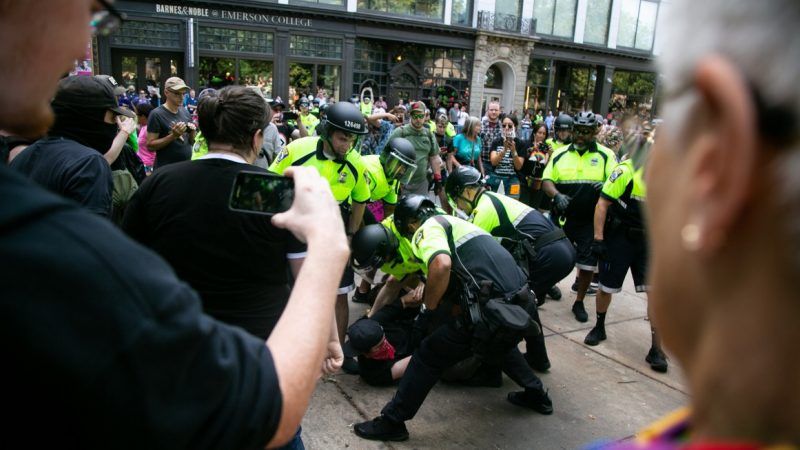Boston Judge Smacked Down for Overruling D.A. Who Tried To Drop 'Straight Pride' Protest Charges
Top justice rules that trying to push a criminal case forward over prosecutors’ objections is a violation of separation of powers.

Massachusetts' top court has ruled that a judge overstepped his bounds by trying to keep the local district attorney from dropping charges against a protester. The protester was arrested at a recent "Straight Pride" march in Boston.
On Saturday, August 31, progressive protesters collided with alt-righters at a trollish "Straight Pride" march intended to inflame antagonism. Police used pepper spray on some protesters and ultimately arrested 36 people, some of whom they said were throwing rocks and unidentified liquids at the police themselves. Four officers reported non-life-threatening injuries.
One man, Roderick Webber, was recorded being arrested while apparently peacefully speaking and filming the event. Recently elected Suffolk County District Attorney Rachael Rollins decided she would not press charges against Webber and others brought in for nonviolent crimes at the rally, part of her effort to scale back overprosecution of petty crimes.
This did not sit well with Boston Municipal Court Judge Richard Sinnott, who last week refused to let Rollins drop charges against seven defendants, including Webber. And when a defense attorney tried to object to Sinnott's behavior and to argue that he was overreaching his authority, he had her removed from the court.
Rollins criticized Sinnott's behavior and petitioned the Supreme Judicial Court (Massachusetts' top court) asking for some sort of intervention. Today, the Boston Globe reports, Rollins got her wish. Justice Frank Ganziano agreed that Sinnott had overstepped his authority and infringed on separation of powers when he attempted to push these cases forward in defiance of the District Attorney's Office's requests.
"The prosecutor's sole authority to determine which cases to prosecute, and when not to pursue a prosecution, has been affirmed repeatedly by this court since the beginning of the nineteenth century," he wrote, citing Massachusetts case law going all the way back to 1806.
This ruling specifically applies to Webber, but the same arguments clearly extend to any cases that Rollins chooses to drop. As I wrote last week as this drama was unfolding, if Sinnott objects to Rollins' prosecutorial priorities, the constitutionally proper response is to support her opponent in the next election—or just run against her himself.


Show Comments (41)